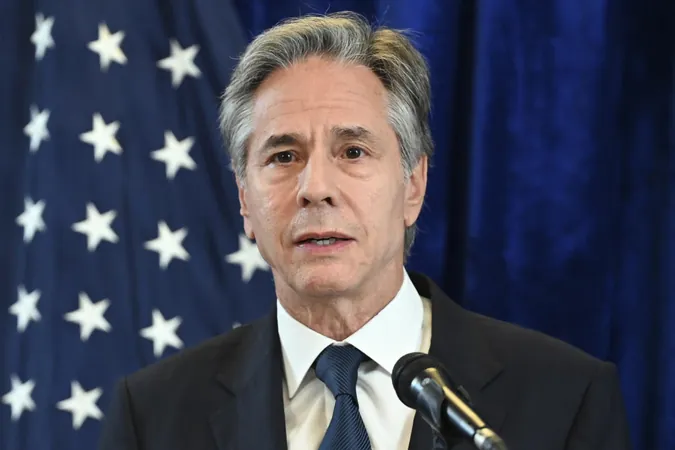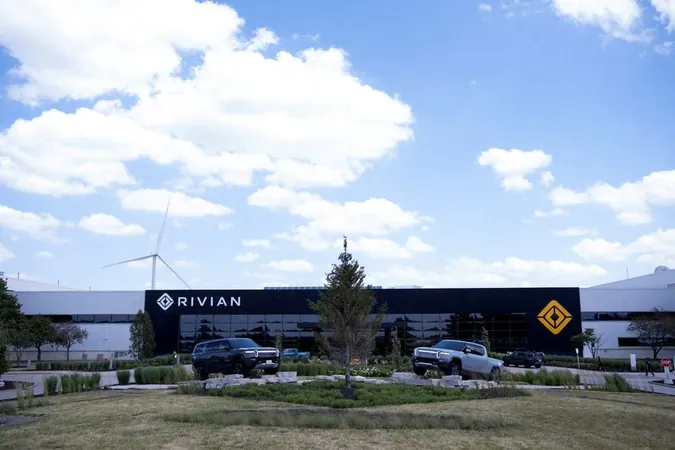
Is Lebanon on the Verge of Political Renewal Amidst Chaos?
2024-10-11
Author: Ling
Overview
In a surprising turn of events, political analysts in Washington are now speculating that the current turmoil in Lebanon may offer a rare opportunity to overcome the longstanding political impasse that has plagued the nation. This speculation follows recent developments in the ongoing conflict involving Israel and Hezbollah, particularly after Israel's military operations have reportedly diminished the strength of the militant group’s leadership.
U.S. Diplomatic Efforts
U.S. Secretary of State Antony Blinken has taken the initiative, engaging in separate dialogues on Friday with acting Lebanese Prime Minister Najib Mikati and Parliament Speaker Nabhi Berri to emphasize the urgent need for political resolution. “The presidency has been vacant for two years now; having a head of state is crucial for the Lebanese people,” Blinken remarked, reinforcing the idea that stabilizing Lebanon’s governance structure is a priority.
Blinken's phone calls are part of a broader diplomatic effort involving discussions with key regional players, including Saudi, Qatari, and French counterparts. Central to these conversations is the notion that electing a new Lebanese president could be pivotal in reducing tensions across the Middle East, potentially prompting Hezbollah to withdraw its forces from Israel's northern border in adherence to a U.N. Security Council resolution that followed the 2006 war.
Challenges Ahead
However, achieving this resolution is no easy task. The entrenched sectarian power-sharing system in Lebanon has historically resulted in frequent political stalemates. The two-year void since former President Michel Aoun's departure in October 2022 is reflective of deeper divisions within the Lebanese Parliament, which has repeatedly failed to elect his successor. Hezbollah has been rallying behind Sleiman Frangieh, a Christian politician aligned with their interests, while other factions consider alternative candidates, notably General Joseph Aoun, who is viewed favorably by the U.S.
Economic Crisis and Governance Needs
The stakes are high, as Lebanon's economic crisis has pushed around 75% of its population into poverty, creating an urgent need for effective governance. Some U.S. officials, speaking anonymously, express cautious optimism that the current geopolitical landscape, characterized by Hezbollah's diminished operational capabilities, may facilitate a breakthrough in the political process.
Diplomatic Engagement and Future Prospects
Despite varying views on Hezbollah’s entrenched influence within Lebanon’s political fabric, even skeptics acknowledge the need for diplomatic engagement and are open to pursuing new avenues for negotiation.
As discussions unfold, Blinken has reiterated a commitment to a diplomatic solution that would allow civilians on both sides of the Israel-Lebanon border to return home safely - a vision of stability that many wish to see enacted. His upcoming attendance at an international conference on Lebanon, hosted by France, underscores the U.S.'s intent to remain actively involved in seeking solutions to Lebanon's multifaceted crises.
The Call for Change
The situation in Lebanon continues to evolve, with advocates urging parliamentary members to prioritize the election of a governance that is transparent, competent, and reform-focused. 'It is vital for Lebanon’s parliamentarians to convene and elect a leader who can guide the country out of this perilous phase,' says Ed Gabriel, president of the American Task Force on Lebanon.
Conclusion
As the international community watches with bated breath, the question looms: Is Lebanon finally on the cusp of political transformation, or are these efforts merely a bandage on deeper wounds? Only time will tell as this historic crisis reaches critical junctures in governance and stability.


 Brasil (PT)
Brasil (PT)
 Canada (EN)
Canada (EN)
 Chile (ES)
Chile (ES)
 España (ES)
España (ES)
 France (FR)
France (FR)
 Hong Kong (EN)
Hong Kong (EN)
 Italia (IT)
Italia (IT)
 日本 (JA)
日本 (JA)
 Magyarország (HU)
Magyarország (HU)
 Norge (NO)
Norge (NO)
 Polska (PL)
Polska (PL)
 Schweiz (DE)
Schweiz (DE)
 Singapore (EN)
Singapore (EN)
 Sverige (SV)
Sverige (SV)
 Suomi (FI)
Suomi (FI)
 Türkiye (TR)
Türkiye (TR)